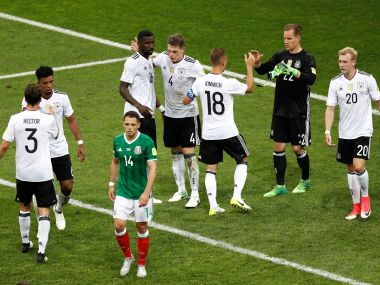Germany entered the field against Mexico with a large banner reading ‘кубок наш’ — ‘The Cup is Ours,’ a cheeky warning to opponents…umm, no that didn’t happen, but one might have been forgiven for thinking so, with the world champions in imperious form, applying heavy metal pressure from the first kick, smothering any Mexican enterprise and strangling El Tri with quick-fire goals from Leon Goretzka. The game was over before it had begun in earnest. After eighth minutes all that was left for Germany to do was hit Mexico on the counter. Joachim Loew’s team were at their best, matching simple execution with a frightening directness, exalting all the fine traits of the modern game. They charged at the goal of Guillermo Ochao and made football look simple again. The Mexicans were left nonplussed. [caption id=“attachment_3761169” align=“alignleft” width=“380”] Germany’s players celebrate at the end of the semi-final against Mexico. Reuters [/caption] Germany were regal with self-assurance and confidence, but not a hint of arrogance. Instead they exuded a healthy self-esteem, conscious of their own strengths and limitations, calculated in their movements and yet floating with so much souplesse. Was this a second-string German team? Yes, Manuel Neuer, Jerome Boateng, Holger Badstuber, Matt Hummels, Andre Schurrle, Toni Kroos, Sami Khedira, Marco Reus, Thomas Muller, Mesut Ozil and Mario Gomez were enjoying their holidays on far-flung beaches, but Goretzka and Co played triple A football. They were an XI that’d easily rank in the global top 10. On a subtropical night in Sochi, Timo Werner’s goal was perhaps the culmination of Germany’s superlative endeavors, not per se because it had ‘made in Germany’ written all over it, a swift and simple team goal with Julian Draxler as conductor, Jonas Hector the catalyst and Werner the finisher, but simply because a striker scored. Goretzka had scored Germany’s first two goal. In Russia he has lit up this Germany team. The Schalke player is a midfield metronome in the making, with vision and plenty of horsepower, and his deep-lying runs unsettled Mexico. The opposing defenders couldn’t track him. A player, who shed pork, nuts and dairy to improve his condition, will be a Bayern Munich transfer target in August. He is the heir apparent to a long list of recent midfield products, the Schweinsteigers and Kroos’ of Teutonic yield, but Germany have a problem higher up the pitch, where strikers have become a rarity. The German game no longer produces Fritz Walter, Uwe Seeler, Gerd Muller, Rudi Voller or a Jurgen Klinsmann. Even Miroslav Klose, who retired from international football after the 2014 World Cup, seems to belong to a distant past of dinosaurs. This paucity in strikers has posed problems for Loew. In the Euro 2016 semi-final against France, in the boiling cauldron of the Stade Velodrome, Germany sized total control of the match, spacing and moving with elegance and ease. They outnumbered France in the midfield, with Hector and Joshua Kimmich overlapping and Ozil and Draxler drifting inside. The Germans teased and stretched the opposing defense, but the shortage of classic striker was their downfall. It’s a scenario Loew wants to avoid at the World Cup. In Marseille, Muller wasn’t the focal point up front of his outstanding World Cup performances. Germany played with 9,000 attacking midfielders, but not a single striker. It was a production fault in Germany’s otherwise perfect youth development. Loew was one of the masterminds, alongside Klinsmann, behind Germany’s revival in the noughties, focusing on assertive and intense youth education, but the development of strikers was overlooked as the next-generation conveyor belt seemingly never stopped in Germany. Today, the German coach has drafted Werner and Sandro Wagner into his squad. The former, who may gain Champions League with Red Bull Leipizig, could strengthen Germany at Russia 2018. Werner’s goal de facto eliminated Mexico. His team were — bring on more superlatives — superb and clinical, showing the great depth of Germany’s talent pool with substitute Amin Younes scoring Die Mannschaft’s fourth goal. In the second half they applied their typical ‘Umschaltspiel,’ exploiting the space in midfield as Mexico poured forward. Perhaps the debate about Germany’s striking prowess was somewhat less important on a night of German excellence, but Loew knows that he needs a striker come next July. Still, Germany’s average age was 23.8 years, Mexico’s 27.8. They were bright, and their future is even more so, with or without a classic number nine.
Germany were at their best in their semi-final, matching simple execution with a frightening directness, exalting all the fine traits of the modern game.
Advertisement
End of Article


)

)
)
)
)
)
)
)
)



